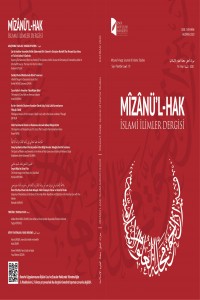Öz
The most critical challenge facing Muslim today is the lack of the spiritual ethical dimension of life, and one of the most powerful means to overcome this problem is the adherence to the code of ethics. This paper attempts at clarifying the concept of Islamic ethics as a basic pillar for a healthy society. It explains about the need of ethics for the development of individual and society, and its significance on the character building. The author tries to present ethics as the counter part of other sciences, such as, law, politics, science, economics, and others for such sciences become soulless or insignificant if detached from ethics. The paper concludes that Muslim character should develop along with Islamic ethics and its application into daily affairs of Muslims’ lives should be given its due attention.
Anahtar Kelimeler
Kaynakça
- N. O. Mohd, Christian and Muslim Ethics
- A. Q. Muhammad, The Ethics of al-Ghazali: A Composite Ethics in Islam
- R. G. Hovanniasian, Ethics in Islam
- M. D. Sheila, Muslim Ethics and Modernity
- M. Fakhry, Ethical Theories in Islam
- Abdul Haq Ansari, “ Islamic Ethics: Concept and Prospect”, The American Journal of Islamic Social Sciences, 6 (1989): 86
- M. Fakhry, Ethics in Islamic Philosophy and Ethical Theories in Islam
- A. K. M. Ibrahim, Morals and Manners in Islam
- Abdul Haq Ansari, The Ethical Philosophy of Miskawayh
- Abu Ishaq, al-Muwafaqat fi Usul al-Shariaah, Hazırlayan: Abdullah al-Darraz
- H. A. Abdul, “Islamic ethics: Concept and prospect,” The American Journal of Islamic Social Science, Herndon, USA: The International Institute of Islamic Thought (IIIT) & The Association of Muslim Social Scientists (AMSS),1989, c. 6, no. 1, 86.
Öz
Günümüzde Müslümanların karşılaştığı en kritik zorluk, yaşamın manevi ahlâkî boyutunun olmamasıdır. Bu sorunun üstesinden gelmenin en güçlü yollarından biri ise ahlak kurallarına olan bağlılıktır. Bu makale, sağlıklı bir toplum için İslam ahlakı kavramını temel bir dayanak olarak netleştirmeye çalışmaktadır. Makale ayrıca bireyin ve toplumun gelişimi için ahlakın gerekliliğini ve karakter oluşturmadaki önemini açıklamaktadır. Yazar, ahlakı; hukuk, siyaset, bilim, iktisat gibi diğer ilimlerin muadili ve bu gibi ilimlerin ahlaktan ayrılırsa ruhsuz ve önemsiz hale geleceğini göstermeye çalışmaktadır. Makale, Müslüman karakterin İslam ahlakı ile birlikte gelişmesi ve Müslümanların yaşamlarının günlük işlerine uygulanması konusunda gereken özeni göstermeleri gerektiği sonucuna varmıştır.
Anahtar Kelimeler
Kaynakça
- N. O. Mohd, Christian and Muslim Ethics
- A. Q. Muhammad, The Ethics of al-Ghazali: A Composite Ethics in Islam
- R. G. Hovanniasian, Ethics in Islam
- M. D. Sheila, Muslim Ethics and Modernity
- M. Fakhry, Ethical Theories in Islam
- Abdul Haq Ansari, “ Islamic Ethics: Concept and Prospect”, The American Journal of Islamic Social Sciences, 6 (1989): 86
- M. Fakhry, Ethics in Islamic Philosophy and Ethical Theories in Islam
- A. K. M. Ibrahim, Morals and Manners in Islam
- Abdul Haq Ansari, The Ethical Philosophy of Miskawayh
- Abu Ishaq, al-Muwafaqat fi Usul al-Shariaah, Hazırlayan: Abdullah al-Darraz
- H. A. Abdul, “Islamic ethics: Concept and prospect,” The American Journal of Islamic Social Science, Herndon, USA: The International Institute of Islamic Thought (IIIT) & The Association of Muslim Social Scientists (AMSS),1989, c. 6, no. 1, 86.
Ayrıntılar
| Birincil Dil | İngilizce |
|---|---|
| Konular | Felsefe, Din Araştırmaları |
| Bölüm | Tercüme Yazılar |
| Yazarlar | |
| Çevirmenler | |
| Yayımlanma Tarihi | 30 Haziran 2020 |
| Gönderilme Tarihi | 16 Mart 2020 |
| Kabul Tarihi | 9 Haziran 2020 |
| Yayımlandığı Sayı | Yıl 2020 Sayı: 10 |


